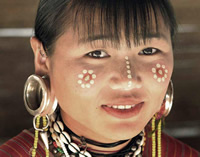Kayah Western in Thailand

Photo Source:
Asia Harvest-Operation Myanmar
|
Send Joshua Project a map of this people group.
|
| People Name: | Kayah Western |
| Country: | Thailand |
| 10/40 Window: | Yes |
| Population: | 22,000 |
| World Population: | 184,000 |
| Primary Language: | Kayah, Western |
| Primary Religion: | Buddhism |
| Christian Adherents: | 28.00 % |
| Evangelicals: | 2.00 % |
| Scripture: | New Testament |
| Ministry Resources: | Yes |
| Jesus Film: | Yes |
| Audio Recordings: | Yes |
| People Cluster: | Karen |
| Affinity Bloc: | Tibetan-Himalayan Peoples |
| Progress Level: |
|
Introduction / History
With a population in excess of a quarter million, the Western Kayah are the largest ethnic group in Kayah State in eastern Myanmar. One source states, 'Myanmar's Kayah State sits on its eastern border with Thailand, directly opposite Mae Hong Son Province. The entire state is consumed by a range of mountains that stretch the length of the eastern section of the country, varying in elevation from 3,000 to 8,000 feet within the Kayah State itself. Two major rivers, the Nampawn and the mighty Salween, run on a north-south route through the area, and have served as geographical landmarks throughout the fierce fighting which has raged here for over 20 years. The majority of the population lives in the military occupied towns and villages of the western third of the state and along the rebel borderlands near Thailand as IDPs (Internally Displaced Peoples). The entire state is off-limits to foreigners.' The main center for the Kayah people is the town of Loikaw in north-western Kayah State.
The Kayah are an 'often confused or misunderstood group of people. They are regularly confused with the term Karenni, a blanket term used to cover all groups living within the Kayah State of eastern Myanmar. Karenni can include the Padaung, Sgaw Karen, Kayah, and a couple of other small groups.... The true Kayah live primarily in the northern half of the State, and speak their own language, though most also speak Sgaw Karen.' The Kayah are also called by the nickname Red Karen because of their brightly-colored red head-cloths and shawls.
The Western Kayah speak a different language from the Eastern Kayah, who live in eastern Kayah State and in Thailand. Speakers of Eastern Kayah 'have difficulty understanding Western Kayah of Myanmar.'
What Are Their Lives Like?
There are also Western Kayah refugees stuck in refugee camps across the border in Thailand. Many Kayah are always on the move, travelling just ahead of the war parties from one location to another. Large numbers started fleeing Myanmar in the early 1990s, escaping the war between the Burmese military and the KNPP (Karenni National Progressive Party), an anti-government faction operating in the Kayah State. Numerous horrific human rights abuses such as genocide and mass rape have been committed against the Kayah people by Burmese soldiers.
What Are Their Beliefs?
The Western Kayah are 'primarily Buddhist in name, though there are very strong animistic characteristics woven throughout their belief system. They observe Buddhist rituals and make periodic visits to pagodas and monasteries, but almost all villages participate in spirit worship, paying homage to the nats, or other spirits. 'PRGRPHBecause Kayah State is completely off-limits to foreigners, it is difficult to gauge the number of Christians among the Western Kayah today, though the number is small and not likely to exceed one or two percent of the population. Perhaps a thousand of the Western Kayah refugees in Thailand have turned to Christ, the result of practical love and evangelism by Karen Christian refugees and foreign missionaries.
What Are Their Needs?
The Western Karen need peace so they can flourish. As it stands, instead of leading productive lives, they must focus on staying alive because of the Burmese military.
Prayer Points
Pray for peace and justice in the Western Karen homeland.
Pray for the Lord to protect them wherever they are.
Pray for the current situation to open their hearts to the Lord.
Pray for the Lord to use them to disciple those without a gospel witness.